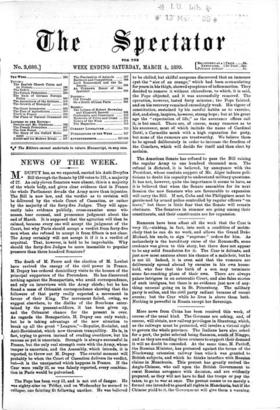The death of M. Faure and the election of M.
Loubet have revived the energy of the civil power in France. M. Dupny has ordered domiciliary visits to the houses of the principal supporters of the Pretenders. He has discovered nothing against the Bonapartisits, who avoid correspondence, and rely on interviews with the Army chiefs ; but he has found a mass of Orleanist correspondence showing that the followers of that party really expected a movement in favour of their Bing. The movement failed, owing, we suggest elsewhere, to the dislike of the Bourbons enter- tained by the peasant-soldiers, it has been given up, and the Orleanist chance for the present is over. As regards the Bonapartists, M. Dupuy can only watch ; but he is taking advantage of the new situation to break up all the great 'Leagues,"—Royalist, Socialist, and Anti-Revisionist, which now threaten tranquillity. He is, in fact, trying to govern instead of evading overthrow, but his success as yet is uncertain. Strength is always successful in France, but the only real strength rests with the Army, whose temper is uncertain, and the Assembly, which intends, it is reported, to throw out M. Dnpuy. The crucial moment will probably be when the Court of Caseation delivers its verdict, but—it is the unexpected which happens in France. If the Czar were really ill, as was falsely reported, every combine, tion in Paris would be pulverised.






































